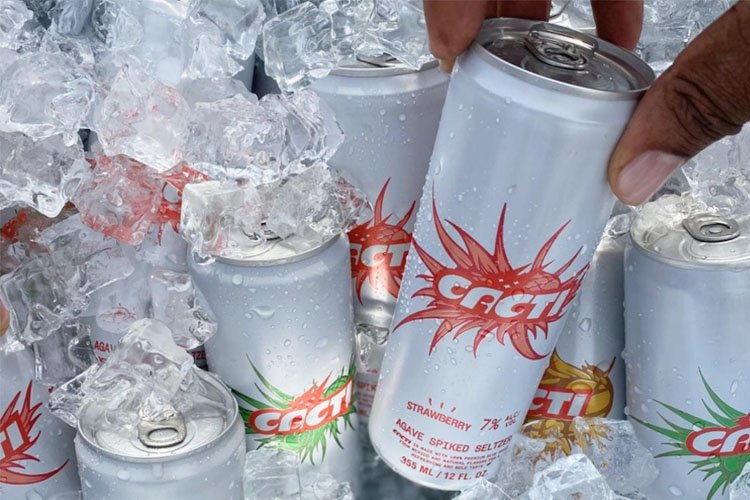THE GIST
Nine months after launching Cacti Agave Spiked Seltzer as “the future of hard seltzer,” Anheuser-Busch InBev (ABI) has pulled the plug on the once-white-hot brand. The move, first reported by Beer Business Daily and Beer Marketer’s Insights, indicates how little patience major players have for brand building in the long tail of the hard seltzer market, and is evidence that ABI plans to let Bud Light Hard Seltzer (#3 in chain stores), Michelob ULTRA Organic Seltzer (#6), and Bud Light Platinum Seltzer (#11) take center stage for the foreseeable future.
Cacti, a top-5 hard seltzer brand within a week of its launch, saw sales fall to, at best, 1.1% of the market, the #9 spot overall.
White Claw and Truly, the top brand families in the category, account for 69% of all chain retail sales. The eight brands ahead of Cacti account for 88.9% of share.
Combined on- and off-premise data from Fintech and the National Beer Wholesalers Association (NBWA) had Cacti at just over half a percent of the hard seltzer market, although it’s not clear if ABI had put effort behind Cacti for on-premise placements in lieu of Bud Light seltzer, which earned about 2% of total can volume in 2021.
Fintech and the NBWA only show category leaders White Claw (9%), Truly (2.6%), and Bud Light Hard Seltzer (1.9%) as having any significant can share in the on-premise.
Meanwhile, off-premise chain retail data tracked by IRI puts Cacti at 1.1% of all its hard seltzer sales in grocery, convenience, and big box stores.
But ABI’s focus on hard seltzer families with far more brand affinity wasn’t the only problem facing Cacti. It was the target of a class-action lawsuit over its use of the word “agave,” and rapper Travis Scott, the official partner and celebrity endorser of the brand, is caught in his own legal trouble. Ten people died during a crowd surge during Scott’s performance at Astroworld festival on Nov. 5 and is being sued as part of its fallout. A representative for the rapper told Ad Age that his partnership with ABI expired on Nov. 30, and characterized the decision to end his involvement as “mutual.” ABI had previously referred to the partnership as “a long-term collaborative effort.”
WHY IT MATTERS
Hard seltzers sold $5 billion in U.S. chain retail stores tracked by IRI during the most recent 52-week period ending Nov. 28, almost three times what the category sold in 2019. Even 1% of that long-tail market represents millions of dollars—for Cacti it was $51.2 million, not much less than what Oskar Blues Brewery and Harpoon Brewery sold combined in IRI-tracked chain retail.
As the country’s largest seltzer brands continue to dominate the market, ABI appears to be losing patience with brands that aren’t picking up significant chunks of what’s left. (The top-10 seltzer brands in chain retail tracked by IRI represented 90.7% of the hard seltzer market last year and 90.9% of the market this year.) Given the class-action lawsuit and Travis Scott’s embattled image, Cacti’s sliver of the market no longer seems worth the brand-building effort.
Instead, ABI is retrenching behind what it knows well: extensions of existing brands with name recognition. After it spent big to buy Spiked Seltzer (now called Bon & Viv) in 2016, and further spent roughly $5 million on a Super Bowl commercial for the brand in 2019, ABI has watched the brand fall from a $58 million per year brand in 2018 to one that’s on pace to barely hit $15 million this year in IRI-tracked chain retail. ABI hedged its bets with line extensions—Bud Light Hard Seltzer and Bud Light Platinum Hard Seltzer, which debuted in 2020, and Michelob ULTRA Organic Seltzer in 2021.
The beverage company still produces Bon & Viv and Natty Light Hard Seltzer, but like Cacti, ABI is allowing them to take a back-burner role to other hard seltzer brands in the company’s portfolio.
ABI’s largest U.S. rival, Molson Coors Beverage Company, has made a similar choice, consolidating its seltzer offerings behind its best performers. In July, Molson Coors discontinued Coors Seltzer, which still ranks as the country’s 15th best-selling hard seltzer brand year to date. The company is instead concentrating on Vizzy, the U.S.’s #4 hard seltzer brand, and Topo Chico Hard Seltzer, the number eight hard seltzer brand. After debuting in March, Topo Chico Hard Seltzer now holds 2.2% of the U.S. hard seltzer market, aided by brand recognition for its non-alcoholic sparkling water which is sold in all 50 states and has grown rapidly for years.
Change happens fast in hard seltzer’s long tail as companies try to assess which of their offerings will be lead horses. Just nine months ago, Cacti made headlines with a record-breaking launch that saw it sell out in thousands of stores and online—Brewbound reported Cacti sold more in its first week than any hard seltzer variety pack in ABI history. Thanks in part to Scott’s celebrity backing, it also reportedly became ABI’s most-followed brand on social media, and one of the most-followed alcohol brands across social media, period. (ABI has since deleted Cacti’s social media accounts.)
ABI thought the partnership with Scott had legs, telling Campaign US, a communications industry publication, in May that: “This is much more than a limited-edition product drop; it is a long-term collaborative effort for all parties involved.”
It wasn’t meant to be. An unforeseen tragedy—and a class-action lawsuit—dulled the shine Cacti once had. The brand will go down as another example of ABI prioritizing brands with long-term name recognition and equity over truly new innovation and, at least early on, strong promise.


